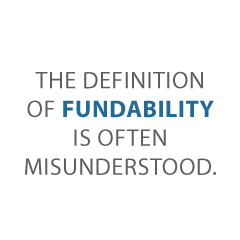- Connect With Us!
- (877) 600-2487
- info@creditsuite.com
A Working Fundability Definition
Published By Faith Stewart at February 19th, 2020
The definition of fundability is often misunderstood. It’s hard to get a grip on a fundability definition. The term is thrown around a lot, but few understand what it really means.
Getting a Grasp on a Fundability Definition
Fundability Definition: Foundation 
You cannot talk about a working fundability definition without talking about the foundation of fundability. This is how your business is set up. It has to appear to be a fundable entity separate from you, the owner. Like any foundation, it is best to start at the beginning. It will be faster and easier if you do. If your business is already up and running however, you may not have that option. It’s never too late to start, but start now. The longer you wait the harder it will be, for several reasons.
Contact Information
The first step in setting up a foundation of fundability is to ensure your business has its own phone number, fax number, and address. Of course, that doesn’t mean you have to get a separate phone line, or even a separate location. You can still run your business from your home or on your computer. You do not even have to have a fax machine.
In fact, you can easily get a business phone number and fax number will work over the internet instead of phone lines. In addition, the phone number will forward to any phone you want it too so you can just use your personal cell phone or landline if you want. Whenever someone calls your business number it will ring straight to you.
You can use a virtual office for a business address. What is that, and how do you get one? It’s not what you may think. There are businesses that offer a physical address for a fee, and sometimes they even offer mail service and live receptionist services. In addition, there are some that offer meeting spaces for those times you may need to meet a client or customer in person.
EIN
The next thing you need to do is get an EIN for your business. This is an identifying number for your business that works in a way similar to how your SSN works for you personally. Some business owners used their SSN for their business. This is what a lot of sole proprietorships and partnerships do. However, it really doesn’t look professional to lenders, and it can cause your personal and business credit to get all mixed up. When you are looking to increase fundability, you need to apply for and use an EIN. You can get one for free from the IRS.
Incorporate
This is the most important step in fundability thus far. Incorporating your business as an LLC, S-corp, or corporation is necessary to fundability. It lends credence to your business as one that is legitimate. It also offers some protection from liability.
Which option you choose does not matter as much for fundability as it does for your budget and needs for liability protection. The best thing to do is talk to your attorney or a tax professional. When you incorporate, you become a new entity. You basically have to start over. You’ll also lose any positive payment history you may have accumulated as well.
This is why you have to incorporate as soon as possible. It is necessary for an appropriate time in business. The longer you have been in business the more fundable you appear to be. That starts on the date of incorporation, regardless of when you actually started doing business.
Business Bank Account
You have to open a separate, dedicated business bank account. There are a few reasons for this. First, it will help you keep track of business finances. It will also help you keep them separate from personal finances for tax purposes.
Keep your business protected with our professional business credit monitoring.
There’s more to it however. There are several types of funding you cannot get without a business bank account. Many lenders and credit cards want to see one with a minimum average balance. In addition, you cannot get a merchant account without a business account at a bank. That means, you cannot take credit cards payments. Studies show consumers usually spend more when paying by credit card is an option.
Licenses
For a business to be legitimate it has to have all of the necessary licenses it needs to run. If it doesn’t, it is a huge warning to lenders. Do the research you need to do to ensure you have all of the licenses necessary to legitimately run your business at the federal, state, and local levels.
Website
I am sure you are wondering how a business website can affect you ability to get funding. Think about it. These days, you do not exist if you do not have a website. Still, having a poorly put together website can be even worse than not having one at all. It is the first impression you make on many, and if it appears to be unprofessional, it won’t look good to potential customers or lenders.
Spend the time and money necessary to ensure your website is professionally designed and works well. Pay for hosting too. Don’t use a free hosting service. Along these same lines, your business needs a dedicated business email address. Make sure it has the same URL as your Website. Don’t use a free service such as Yahoo or Gmail.
Fundability Definition: Business Credit Reports
This is the credit report, much like your consumer credit report, that details the credit history of your business. It is a tool to help lenders determine how credit worthy your business is.
Where do business credit reports come from? There are a lot of different places, but the main ones are Dun & Bradstreet, Experian, Equifax, and FICO SBSS. Since you have no way of knowing which one your lender will choose, you need to make sure all of these reports are up to date and accurate.
Other Business Data Agencies
In addition to the business credit reporting agencies that directly calculate and issue credit reports, there are other business data agencies that affect those reports indirectly. Two examples of this are LexisNexis and The Small Business Finance Exchange. These two agencies gather data from different sources, including public records. This means they could even have access to information relating to automobile accidents and liens. While you may not be able to access or change the data these agencies have on your business, you can ensure that any new information they receive is positive. Enough positive information can help distract attention from negative information.
Identification Numbers
Dun & Bradstreet is the largest and most commonly used business credit reporting agency. Every credit file in their database has a D-U-N-S number. To get a D-U-N-S number, you have to apply for one through the D&B website. You have to have this number to have a file with D&B, and you have to have a file with D&B to build business credit.
Business Credit History
Your credit history has everything to do with everything related to your credit score, which is a huge factor in the fundability of your business.
Your credit history consists of a number of things including:
- How many accounts are reporting payments?
- How long have you had each account?
- What type of accounts are they?
- How much credit are you using on each account versus how much is available?
- Are you making your payments on these accounts consistently on-time?
The more accounts you have reporting on-time payments, the stronger your credit score will be.
Business Information
On the surface, it seems obvious that all of your business information should be the same across the board. However, when you start changing things up, like adding a business phone number and address or incorporating, you may find that some things slip through the cracks.
This is a problem because of those fraud concerns lenders have. When business information doesn’t match up, it sets off alarms. Maybe your business licenses have your personal address but now you have a business address. You have to change it. Perhaps some of your credit accounts have a slightly different name or a different phone number listed than what is on your loan application. Do your insurances all have the same information?
The key to this piece of the business fundability is to monitor your reports frequently. When it comes to business credit reports, you can monitor through the reporting agencies directly, or save money by going here.
Keep your business protected with our professional business credit monitoring.
Fundability Definition: Financial Statements
Both your personal and business tax returns need to be in order. Not only that, but you need to be paying your taxes, both business and personal.
It is best to have an accounting professional prepare regular financial statements for your business. Having an accountant’s name on financial statements lends to the legitimacy of your business. If you cannot afford this monthly or quarterly, at least have professional statements prepared annually. Then, they are at the ready whenever you need to apply for a loan.
Often tax returns for the previous three years will suffice for personal financials. Get a tax professional to prepare them. This is the bare minimum you will need. Lenders may also ask to see check stubs and bank statements.
Bureaus
There are several other agencies that hold information related to your personal finances that you need to know about. For example, many business owners do not realize that their ChexSystems report can affect fundability. In the simplest terms, this details any bad check activity. It makes a difference when it comes to your bank score. If you have too many bad checks, you will not be able to open a bank account. That will seriously affect fundability.
Everything can come back to bite you. Have you ever been convicted of a crime? Do you have a bankruptcy or short sell on your record? How about liens or UCC filings? All of this can and will affect the fundability of your business.
Personal Credit History
Your personal credit score from Experian, Equifax, and Transunion all matter. You have to have your personal credit in order because it will definitely affect the fundability of your business. If it isn’t great right now, get to work on it. The number one way to get a strong personal credit score or improve a weak one is to make payments on time, consistently.
Also, make sure you monitor your personal credit regularly to ensure mistakes are corrected and that there are no fraudulent accounts being reported.
Fundability Definition: The Application Process
First, consider the timing of the application. Is your business fundable right now? If not, do some work to increase fundability. Next, make sure that your business name, business address, and ownership status are all verifiable. Lenders will check. Lastly, make sure you choose the right lending product for your business and your needs. Do you need a traditional loan or a line of credit? Would a working capital loan or expansion loan work best for your needs? Choosing the right product to apply for can make all the difference.
To Understand How to Become Fundable, You Need a Working Fundability Definition
You need your business to be fundable. To make it happen, you have to have a working definition of fundability. That isn’t really enough however. You also need to understand exactly what affects the fundability of your business, and how to mitigate anything that is holding it back. Then, you can get to work making sure your business is as fundable as possible. It may take some time however, depending on where your current fundability stands.
Keep your business protected with our professional business credit monitoring.

 " class="attachment-blog-single size-blog-single wp-post-image" alt="Get Business Credit Cards for New Businesses Credit Suite-Business Line of Credit Decoded" title="Get Business Credit Cards for New Businesses">>
" class="attachment-blog-single size-blog-single wp-post-image" alt="Get Business Credit Cards for New Businesses Credit Suite-Business Line of Credit Decoded" title="Get Business Credit Cards for New Businesses">>